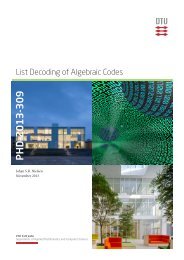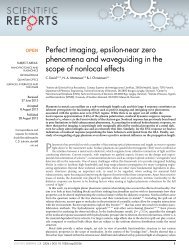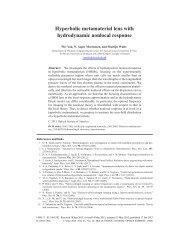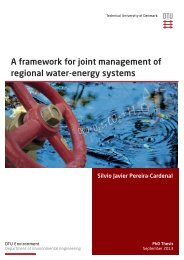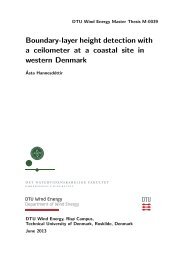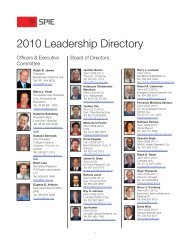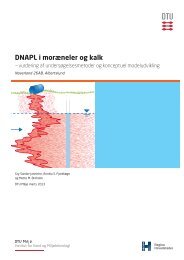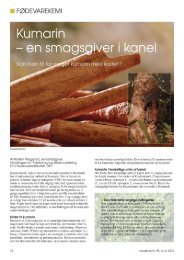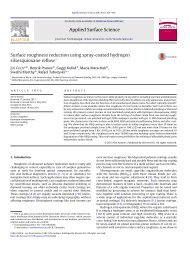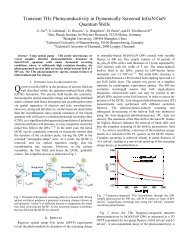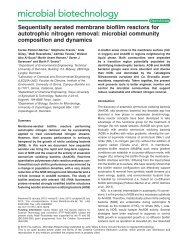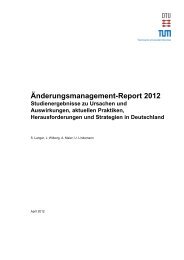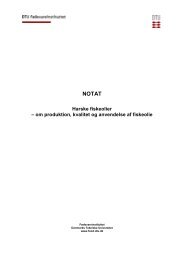PEC12-25 CAPEC-PROCESS Industrial Consortium ... - DTU Orbit
PEC12-25 CAPEC-PROCESS Industrial Consortium ... - DTU Orbit
PEC12-25 CAPEC-PROCESS Industrial Consortium ... - DTU Orbit
You also want an ePaper? Increase the reach of your titles
YUMPU automatically turns print PDFs into web optimized ePapers that Google loves.
Rita Lencastre Fernandes<br />
(RLF)<br />
<strong>PROCESS</strong><br />
Amol S Hukkerikar (AMH)<br />
<strong>CAPEC</strong><br />
Population balance models and computational fluid dynamics:<br />
a model framework to describe heterogeneity in fermentors<br />
The project focuses on the development of models that can<br />
predict the growth and behaviour of heterogeneous microbial<br />
populations. Experimental data is used to formulate Matlab<br />
based models that can predict changes in the microbial<br />
distributed properties (e.g. single cell protein content, growth<br />
and productivity) due to varying environmental conditions in the<br />
fermentor. In a later stage, the population model will be<br />
integrated with a fluid dynamics model for a stirred reactor,<br />
allowing for predicting process behavior under different<br />
environmental conditions. The project is partly funded by the<br />
Danish Council for Strategic Research in the frame of the<br />
project "Towards robust fermentation processes by targeting<br />
population heterogeneity at microscale", and developed in tight<br />
collaboration with the ERA-NET Industry Biotechnology<br />
project "Targeting population heterogeneity at microscale for<br />
robust fermentation processes".<br />
Supervisors: KVG, AJ, Ingmar Nopens (Ghent Univ)<br />
Started: 01-11-2009; Finish: 07-12-2012<br />
Research area: Process-product modelling/design<br />
Model based integrated process-product design - retrofitting<br />
and optimisation<br />
The main objective of this project is to develop a systematic<br />
framework for model based design and optimisation of the<br />
principal unit operations involved in edible oil/bio-fuel industry<br />
and apply the developed methodology for improvement in the<br />
performance of existing installations for edible oil/bio-fuel<br />
processes. Although the oleo-chemical industry is mature and<br />
based on well established processes, the complex systems that<br />
lipids compounds form, and the lack of accurate unit operation<br />
models have limited a wide application of computer aided<br />
methods and tools for process synthesis, modeling and<br />
simulation within this industry. In consequence, the first part of<br />
this project will be the development of unit operations model<br />
library consisting of a collection of new and adopted models<br />
that are not available in existing process simulation tools. The<br />
second part of the work will focus on application of developed<br />
models for optimisation of existing processes with respect to<br />
performance indicators such as minimum operational cost,<br />
product yield improvement and sustainability index.<br />
Supervisors: RaG, GSI, Bent Sarup (Alfa Laval).<br />
Started: 01-07-2010; Finish: 30-06-2013<br />
Research area: A, B, C, E<br />
33



